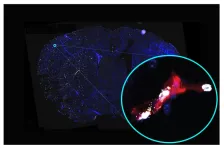(Press-News.org) *Note: this is a joint press release from the European Congress of Clinical Microbiology & Infectious Diseases (ECCMID) and The Lancet Respiratory Medicine. Please credit both the congress and the journal in your stories*
A major UK study has discovered that the disturbed sleep patterns in patients hospitalised with COVID-19 was likely to be a driver of breathlessness.
The study of patients in 38 institutions across the UK was led by University of Manchester and Leicester, presented at the European Congress of Clinical Microbiology & Infectious Diseases (Copenhagen, 15-18 April) and published in The Lancet Respiratory Medicine.
The team discovered that 62% of participants who had been admitted to hospital for COVID-19 had sleep disruption, which was likely to persist for at least 12 months, and highlight for the first time the association between two post-COVID condition symptoms: breathlessness and sleep disruption.
On average, participants who had been hospitalised with COVID-19 slept for over an hour longer, but their sleep patterns were less regular (19% decrease on the sleep regularity scale), than matched participants who were hospitalised due to any cause.
The study researchers also found that participants with sleep disturbance were more likely to have anxiety and muscle weakness, common post-COVID-19 condition symptoms.
Statistical analysis identified that sleep disruption was likely to drive breathlessness directly, but that reduced muscle function and increased anxiety, both recognised causes of breathlessness, could partially mediate the association between sleep disturbance and breathlessness.
The study authors speculate that targeting sleep disruption by reducing anxiety and improving muscle strength in these patients could alleviate breathlessness, but further investigation is needed.
The study used extensive data from the hospitals taking part in the PHOSP-COVID study between March 2020 and October 2021.
PHOSP-COVID is a consortium from across the UK, researching long-term health outcomes for patients hospitalised with COVID-19.
The study was funded by the UK Research and Innovation and others.
Sleep quality was assessed using subjective measures that were self-reported by 638 patients to researchers.
It was also measured objectively in another 729 patients, who wore devices similar to smart watches that measured night-time activity levels.
Both measures consistently revealed a higher prevalence of sleep disturbance in people who had been hospitalised with COVID-19 compared with matched controls from the UK Biobank who had been hospitalised for any cause.
The impact on sleep from hospitalisation due to COVID-19 was irrespective of critical care admission.
One of the authors Dr John Blaikley, a clinical scientist from The University of Manchester and respiratory doctor said: “This study has discovered that sleep disturbance could be an important driver of post-COVID-19 breathlessness – or dyspnoea - because of its associations with reduced muscle function and anxiety.
“If this is the case, then interventions targeting poor sleep quality might be used to manage symptoms and convalescence following COVID-19 hospitalisation, potentially improving patient outcomes.”
First author and mathematician Mr. Callum Jackson from The University of Manchester said: “Understanding the causes of breathlessness is complex since it can arise from conditions that affect the respiratory, neurological, cardiovascular, and mental health systems.
“These same systems are also affected by sleep disturbance, another symptom that has been frequently reported after COVID-19.
“Our findings suggest that sleep disturbance is a common problem after hospitalisation for COVID-19 and is associated with breathlessness.
“We also show this is likely to persist for at least 12 months as subjective sleep quality did not change between 5 and 12 month follow-up visits.”
Professor Chris Brightling from the University of Leicester said: “The strengths of our study include its size, multicentre nature, and the use of different complementary assessment measures to evaluate sleep disturbance. Consistent clinical associations were also observed across each evaluation method.”
“Future research should now assess whether interventions targeting sleep disturbance can improve not only sleep quality but also breathlessness through reducing anxiety and improving muscle strength.”
For media enquires contact: Mike Addelman, Media Relations Officer, Faculty of Biology, Medicine and Health, University of Manchester T) +44 (0) 7717 881567 E) michael.addelman@manchester.ac.uk
John Blaikley is also available for comment, although he is away travelling, currently in Toronto 5 hours behind UK time. There may be a short delay in his response. Please e-mail /WhatsApp first to arrange interview. T) +44 7989 308448 E) john.blaikley@manchester.ac.uk
Alternative contact Tony Kirby in the ECCMID Media Centre. T) +44 7834 385827 E) tony@tonykirby.com
The Lancet Respiratory Medicine: Effects of sleep disturbance on dyspnoea and impaired lung function following hospital admission due to COVID-19 in the UK: a prospective multicentre cohort study
To be presented at a special Lancet journals COVID-19 session in Hall I of the European Congress on Clinical Microbiology & Infectious Diseases (ECCMID 2023) in Copenhagen on Monday April 217 at 16.15-18.15 Copenhagen time (CEST).
Click here view Article under embargo (journalist only link):
Click here to view Comment under embargo (journalist only link)
Click here to view Appendix under embargo (journalist only link)
NOTE: THE ABOVE LINK IS FOR JOURNALISTS ONLY AND WILL BE DEACTIVATED AFTER THE EMBARGO LIFTS. IF YOU WISH TO PROVIDE A LINK TO THIS PAPER FOR YOUR READERS, PLEASE USE THE FOLLOWING, WHICH WILL GO LIVE WHEN THE EMBARGO LIFTS:
The post embargo link for the Article is: https://www.thelancet.com/journals/lanres/article/PIIS2213-2600(23)00124-8/fulltext
The post embargo link for the Comment is: https://www.thelancet.com/journals/lanres/article/PIIS2213-2600(23)00138-8/fulltext
END
Disturbed sleep may partially explain post-COVID condition (long COVID) breathlessness
2023-04-16
ELSE PRESS RELEASES FROM THIS DATE:
Bacterial consortium therapy for prevention of recurrent c difficile infection
2023-04-15
About The Study: Among adults with laboratory-confirmed Clostridioides difficile infection (CDI) with one or more prior CDI episodes in the last six months and those with primary CDI at high risk for recurrence, high-dose VE303 (a novel oral microbiome-directed therapy composed of nonpathogenic, nontoxigenic, commensal strains of Clostridia) prevented recurrent CDI compared with placebo. A larger, phase 3 study is needed to confirm these findings.
Authors: Jeffrey L. Silber, M.D., of Vedanta Biosciences Inc., in Cambridge, Massachusetts, is the corresponding author.
To access the embargoed study: Visit our For The Media website at this link https://media.jamanetwork.com/
(doi:10.1001/jama.2023.4314)
Editor’s ...
Filtering pollution: A microfluidic device for collecting microplastics via acoustic focusing
2023-04-15
Plastic debris particles smaller than 5 mm in size, known as microplastics (MPs), are a serious environmental concern. Formed by the breaking down of plastic waste due to wear and tear and sunlight or produced by fiber waste in laundry wastewater and as microbeads in beauty products, they adsorb and introduce harmful chemicals that pollute the environment. By 2050, MPs might outnumber the fish in the oceans. Under these circumstances, the collection and removal of MPs from water are crucial.
Conventionally, MPs are collected by filtering water through meshes. ...
Detailed guidance on natural pacemaker method published today
2023-04-15
Barcelona, Spain – 15 April 2023: An international consensus statement on the safest and most effective way to implant a pacing system that mimics the heart’s normal function is published today in EP Europace,1 a journal of the European Society of Cardiology (ESC). The document is being launched at the EHRA Conduction System Pacing (CSP) Summit2 and will be discussed during EHRA 2023, a scientific congress of the ESC.3
“It is estimated that 1.4 million patients worldwide will receive a pacemaker in 2023,” said first author ...
Clinical staff MRSA carriage and environmental contamination by other “superbugs” found in Portuguese veterinary practices
2023-04-15
**Note: the release below is from the European Congress of Clinical Microbiology & Infectious Diseases (ECCMID 2023, Copenhagen, 15-18 April). Please credit the conference if you use this story**
Examination tables, scales and other surfaces in small animal veterinary practices are frequently contaminated with multidrug-resistant “superbugs”, the results of a Portuguese study suggest.
The research, which is being presented at this year’s European Congress of Clinical Microbiology & Infectious Diseases (ECCMID) ...
Multidrug-resistant bacteria found in 40% of supermarket meat samples
2023-04-15
**Note: the release below is from the European Congress of Clinical Microbiology & Infectious Diseases (ECCMID 2023, Copenhagen, 15-18 April). Please credit the conference if you use this story**
Multidrug-resistant E. coli were found in 40% of supermarket meat samples tested in a Spanish study. E. coli strains capable of causing severe infections in people were also highly prevalent, this year's European Congress of Clinical Microbiology & Infectious Diseases (ECCMID 2023, Copenhagen, 15-18 April) will hear.
Antibiotic resistance is reaching dangerously high levels around the world. Drug-resistant infections kill ...
Major genetic study reveals how antibiotic resistance varies according to where you live, demographics, and diet
2023-04-15
**Note: the release below is from the European Congress of Clinical Microbiology & Infectious Diseases (ECCMID 2023, Copenhagen, 15-18 April). Please credit the conference if you use this story**
A genetic study analysing the microbiome (bacteria in the gut) of a large nationally representative sample of the Finnish population finds that geographic, demographic, diet, and lifestyle factors are driving the spread of antibiotic resistance in the general population.
The most comprehensive study of its kind by Dr Katariina Pärnänen ...
UK-Portuguese study shows antibiotic-resistant “superbugs” are being passed between dogs and cats and their owners, study strongly suggests
2023-04-15
**Note: the release below is from the European Congress of Clinical Microbiology & Infectious Diseases (ECCMID 2023, Copenhagen, 15-18 April). Please credit the conference if you use this story**
Evidence that multidrug-resistant bacteria are being passed between pet cats and dogs and their owners will be presented at this year’s European Congress of Clinical Microbiology & Infectious Diseases (ECCMID) in Copenhagen, Denmark (15-18 April).
Six pets in Portugal and one in the UK were carrying antibiotic-resistant bacteria similar to those found in their owners, a Portuguese study found.
The finding underlines the importance ...
Study of cerebral blood vessels uncovers potential new drug targets for treating stroke
2023-04-14
Strokes cause numerous changes in gene activity in affected small blood vessels in the brain, and these changes are potentially targetable with existing or future drugs to mitigate brain injury or improve stroke recovery, according to a study led by Weill Cornell Medicine scientists.
In the study, which appears Apr. 14 in the Proceedings of the National Academy of Sciences, the researchers performed a comprehensive survey, in a preclinical model, of gene activity changes in small blood vessels in the brain following stroke. Comparing these changes to those that have been recorded in stroke patients, they catalogued hundreds ...
Tracking a new path to octopus and squid sensing capabilities
2023-04-14
Along their eight arms, octopuses have highly sensitive suckers that allow methodical explorations of the seafloor as they search for nourishment in a “taste by touch” approach. Squids, on the other hand, use a much different tactic to find their next meal: patiently hiding until they ambush their prey in swift bursts.
In a unique analysis that provides a glimpse into the origin stories of new animal traits, a pair of research studies led by University of California San Diego and Harvard University scientists has traced the evolutionary adaptations of octopus and squid sensing capabilities. The studies, featured on ...
Trees in savanna areas of Cerrado produce three times more bark than species in forest areas
2023-04-14
In tropical regions of the planet, savannas and forests often coexist in the same area and are exposed to the same climate. An example is the Cerrado, a Brazilian biome that includes several types of vegetation, from broad-leaved and sclerophyllous in dense woodland or shrubland (cerrado sensu stricto) to semi-evergreen in closed-canopy forest (cerradão), as well as grassland with scattered shrubs (campo sujo) and even semi-deciduous seasonal forest.
Areas of cerradão develop in the absence of fire, in both poor and moderately fertile soil (dystrophic to mesotrophic).
This coexistence intrigues botanists and ecologists ...


